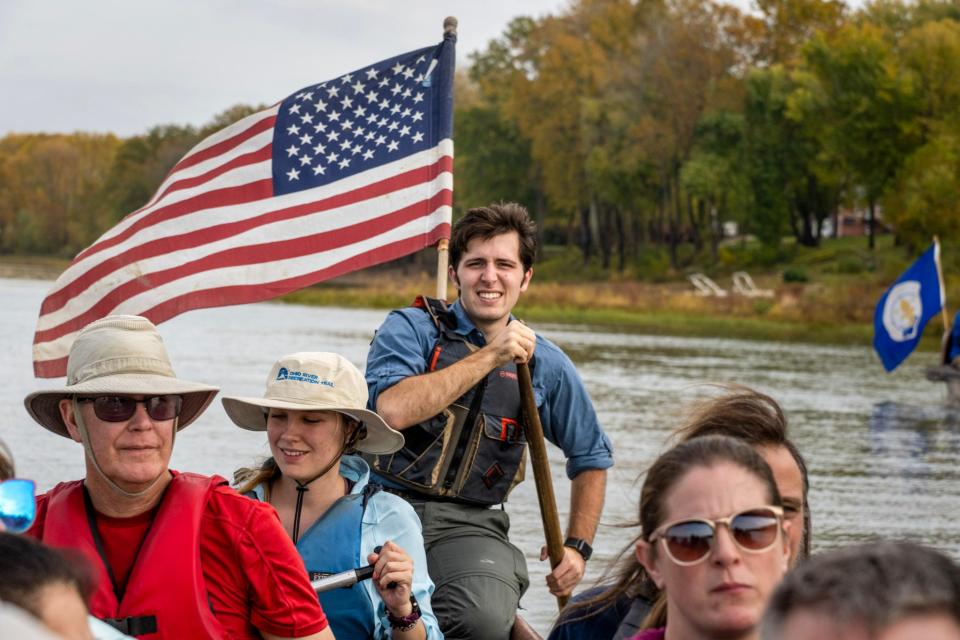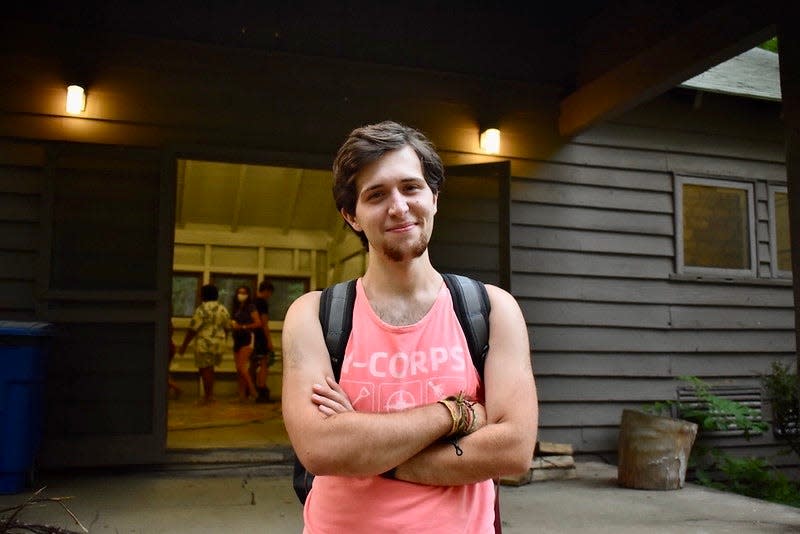Youth mental health is in crisis. Summer camps help kids unplug and reconnect with nature.
For some kids, sticky summer days will soon harbor untold adventures, like plunging into wild waterways. Guitar-in-hand, new friends and old will sing by crackling campfires. Then there’ll be giggling by starlight. Living up to its motto, I’ll always cherish how the kids at my first summer camp—YMCA Camp Piomingo—could “unplug to connect” with each other and nature. That’s a vital remedy in today’s world.
In his new book, "The Anxious Generation," Jonathan Haidt documents how our increasingly online world is the driving force of the global decline in youth wellbeing. At the overnight camps I’ve worked at, I’ve seen this anxiety melt away in my “campers.” While in one of the only phone-free environments they’ve ever experienced, many of my kiddos expressed gratitude for a reprieve from their addictively online normal lives.
The sheer volume of time kids spend online is harmful. The digital realm takes away time with friends and family, time being physically active, time getting a restful night’s sleep. It steals children’s healthy first-loves, introducing them to porn as early as elementary school. Especially for teens, social media instills insecurities rooted in the seemingly perfect posts of their peers. This most impacts girls and inspires disordered eating.
On Facebook since fourth grade and Instagram since sixth, I'm in the older part of that “anxious generation” Haidt describes. I’ve seen the anguish in my peers. In 2019 among my JCPS graduating class, 16% of my peers reported self-harm. Now as an outdoor educator, I’m ever-watchful for scars.
This is the new normal. Suicide is the second leading cause of death among people aged 15-19 globally, according to the WHO. Rates of suicide among Americans aged 10-24 have increased 62% from 2007 to 2021, according to the CDC. This is not to mention rising depression and anxiety.
Connecting kids with nature helps curb youth mental health crisis
Addressing this epidemic demands holistic change from families, schools, and tech-companies. Outdoor adventure is one key part of this discussion. In addition to being phone free, good ol’ fashioned American summer camps—places that exist for the intrinsic good of being outside and having fun—are a uniquely restorative prescription to this epidemic.
Most vitally, kids at camps forge enduring friendships that grow deeper year after year. Additionally, camp staff are often inspiring role-models. Relationships like these counter the global rise in adolescent loneliness driven by social media.
Camps push kids out of their comfort zones. There are theater performances to improvise, high-ropes courses to navigate, and figuring out how to be independent away from home. The resulting resilience and confidence, natural antidotes to anxiety, help youth overcome challenges elsewhere in life.
Often now, kids’ self-esteem is corrupted by social media’s superficial feedback and schools’ test scores. Camps grow a healthier sense of self-worth rooted in being an all around good person; acting with compassion, integrity, and generosity.
There are physical elements too. Compared to being sedentary in front of screens, the days at camp are filled with exercise. Furthermore, I believe camps’ consistent meals, with moderate portions shared over conversation, have the potential to mitigate disordered eating.
More than all of this, overnight camps create a sense of magic that’s difficult to verbalize.
How JCPS' student mental health crisis is Louisville's 'unseen epidemic'

Local camps are making the outdoors accessible to all
If you’re ready to find a camp for the kids in your life, look for those certified by the American Camp Association. The ACA offers advice for parents and has a portal to help you find a camp that’s the right fit.
In the Louisville area, make sure to check out YMCA Camp Piomingo as well as the Girl Scouts of Kentuckiana’s camps. If your kiddo is a teenager, they might be ready for a longer hiking or paddling expedition like those offered by Outward Bound or NOLS.
Programs like these typically offer financial aid, but some organizations are going even further.
“We must do more as a country to make the outdoors accessible to all,” said Brewster Rhoads, a leader in the Cincinnati outdoors community who has come up with a creative solution, founding the Ohio River Paddlefest. The event’s proceeds fund Adventure Crew, a nonprofit that connects Cincinnati-area teens to the outdoors for free.
Do you think kids need to unplug? Submit your letter to the editor here.
Similarly, Louisville ECHO, an initiative made possible by Louisville Parks & Recreation and Wilderness Louisville, is increasing equitable access to the outdoors through programming at Shawnee Park and Jefferson Memorial Forest.
Prasanthi Persad, Wilderness Louisville’s Executive Director, explained that “for kids now, access to devices is a blessing and a curse. The research proves the relationship between time spent in nature and thriving as a human being.”

Forest Clevenger works to increase access to the outdoors through the nonprofit Ohio River Way and has led advocacy for mental health reforms in JCPS. Lately, he’s been volunteering for Girl Scout Camp Judy Layne and their new grassroots endowment.
This article originally appeared on Louisville Courier Journal: Summer camps provide kids a place to unplug and connect with nature

